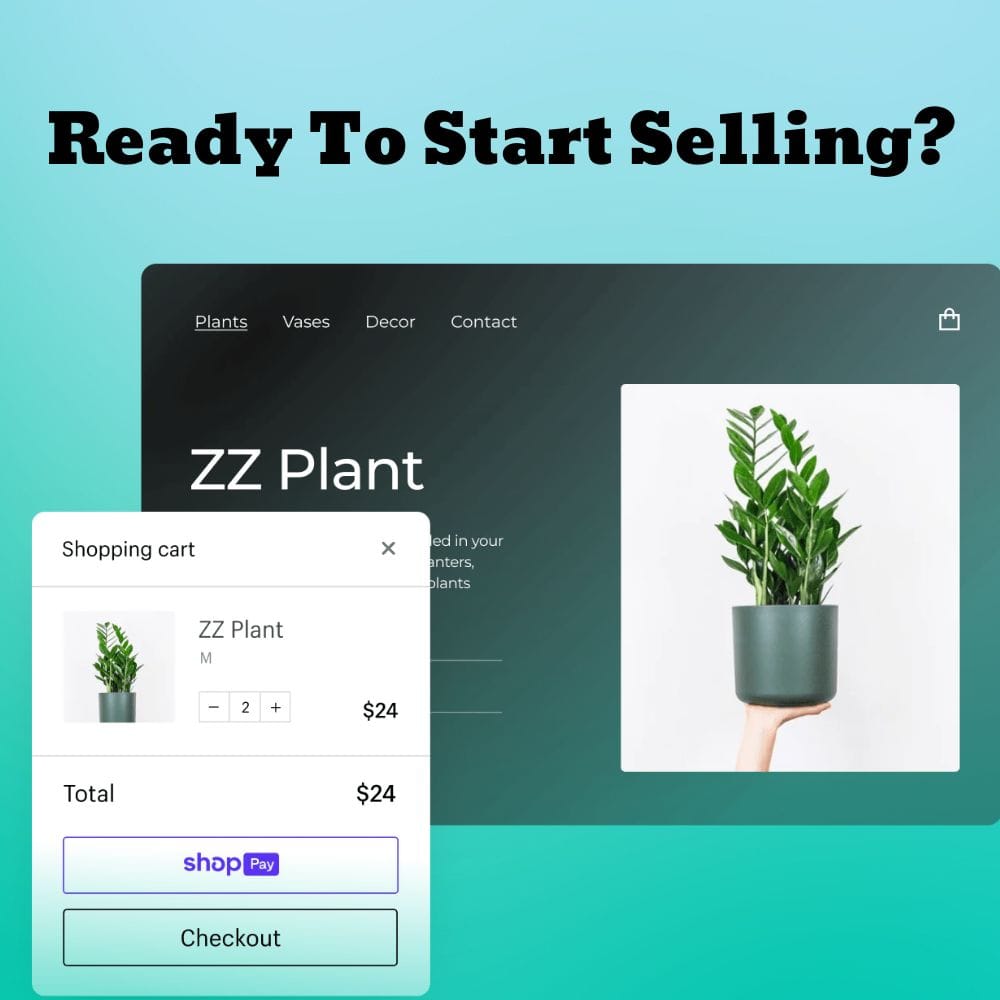Key Takeaways:
- Comprehensive E-commerce Solution: Shopify offers a robust platform that caters to various business sizes and needs, from startups to established enterprises.
- User-Friendly Interface: With its intuitive design and drag-and-drop functionality, Shopify simplifies the process of setting up and managing an online store.
- Flexible and Scalable: Shopify's diverse range of features and integrations ensures that it can grow and adapt with your business.
Introduction to Shopify
Shopify has emerged as a leading ecommerce platform, enabling businesses to create their online stores with ease. But with so many options available, the question remains: is it worth trying Shopify? This review delves deep into the features, costs, and user experiences to provide a clear picture.
How We Choose
Our team has spent hours researching through thousands of user reviews and star ratings for the best software products on the market. We take into account factors such as performance, user experience, technical benchmarks, and affordability when recommending products to enhance our reader's digital lives. We strive to find the best options that meet everyone’s needs - even those on a budget!
We hope you find your next special item below! This software product was independently selected by our editors. Good Guru Reviews may collect a share of sales or other compensation from the links on this page if you decide to buy something (at no additional cost to you, that's how we stay in business). Enjoy finding your next special item with us!
What Shopify Offers
Shopify is not just a website builder; it's a comprehensive ecommerce solution designed to help you sell online. Whether you're a budding entrepreneur or an established retailer, Shopify provides the tools needed to create a professional online presence. From customizable templates to an extensive app store, the platform is equipped to handle a variety of business needs.
Ease of Use: Setting Up Your Shopify Store
One of the most significant advantages of Shopify is its user-friendly interface. Setting up a Shopify store is straightforward, thanks to its drag-and-drop editor. Even those with no technical background can launch their store within hours, making it an attractive option for new entrants in the ecommerce space.
Customization Capabilities
Through the Shopify Theme Store and Shopify App Store, users can extensively customize their sites. The theme store offers a variety of free and paid templates that cater to different aesthetics and industries, while the app store contains thousands of apps to extend functionality, from advanced SEO tools to intricate inventory management systems.
Shopify Pricing: Investment vs. Return
Shopify's pricing plans are designed to accommodate the needs of different business sizes. From the Basic Shopify plan to the Advanced Shopify plan, each tier offers distinct features and capabilities. While the initial cost may seem high to some, the range of features and the potential for online business growth often justify the investment.
Performance and Reliability
Shopify ensures that your e-commerce store remains operational and fast, regardless of traffic spikes. Their reliable hosting solution means you don’t have to worry about website downtime or speed, which are crucial for maintaining customer satisfaction and securing sales.
Shopify Payments and Transaction Fees
Shopify Payments, Shopify's integrated payment solution, simplifies the transaction process by eliminating the need to set up a third-party payment gateway. However, if you choose to use an external gateway, Shopify imposes additional transaction fees, which can accumulate depending on your sales volume.
Shopify Integration Capabilities
Shopify's integration landscape is like a Swiss Army knife for ecommerce businesses, offering a plethora of tools that seamlessly connect with your Shopify store. Whether you're looking to enhance your marketing campaigns, streamline shipping processes, or expand payment options, Shopify's integration framework supports it all. For instance, integrating with third-party apps like Mailchimp or Klaviyo allows for sophisticated email marketing strategies directly linked to customer behaviors on your Shopify site. This connectivity not only simplifies operations but also enriches the customer experience, making it a smooth sail for both new and seasoned Shopify users.
Moreover, the platform's ability to sync with various sales channels including Amazon, eBay, and even social media platforms like Facebook and Instagram, empowers businesses to manage their online presence from a single Shopify dashboard. This feature is particularly beneficial for small businesses aiming to expand their reach without multiplying their workload. By leveraging Shopify's integration capabilities, businesses can ensure their selling strategies are as cohesive as they are comprehensive, ultimately fostering a more profitable business model.

Shopify's Scalability: Growing with Your Business
Shopify's platform is not just a starting block for new entrepreneurs but a growth accelerator for expanding businesses. As your business flourishes, the need for a scalable e-commerce solution becomes paramount. Shopify caters to this need brilliantly by offering various pricing plans that accommodate the growth of your inventory and increase in traffic. Whether you're just starting out or ready to scale up, Shopify's seamless upgrade paths allow you to expand without disrupting your existing operations. This flexibility ensures that your Shopify store can grow as fast and as large as your ambitions do.
Moreover, the platform's robust infrastructure supports high-volume traffic and transactions, which is crucial for businesses during peak sales periods like Black Friday or Cyber Monday. Shopify's ability to handle these surges without a hitch is a testament to its reliability and performance. The platform's scalability is further enhanced by its integration capabilities with various third-party apps and tools, enabling businesses to add new features and functionalities as they grow. This adaptability makes Shopify a wise choice for businesses that anticipate future growth and need an ecommerce solution that grows with them.
Shopify's Integration with Third-Party Apps: Expanding Functionality
Shopify's integration capabilities are like a Swiss Army knife for your ecommerce site, offering a plethora of tools at your fingertips. By connecting Shopify with a wide array of third-party apps, businesses can supercharge their operations, from advanced analytics to intricate marketing automation. These integrations not only streamline various business processes but also enhance the overall user experience. For instance, integrating Shopify with apps like Oberlo allows users to easily add products to their store directly from suppliers, making it a breeze to run a profitable dropshipping business.
Moreover, the Shopify App Store is a treasure trove of functionalities that can be added to your store. Whether you need tools for SEO to boost your site's visibility or apps that handle shipping and inventory management, Shopify's ecosystem supports it all. This flexibility is a significant advantage over many Shopify competitors, as it allows for a highly customized experience without leaving the Shopify platform. Small businesses, in particular, can benefit from these integrations by implementing solutions that address specific needs without a hefty price tag, making the most of Shopify's pricing plans.

Shopify's Role in Streamlining Shipping and Fulfillment
Shopify has carved a niche in simplifying the labyrinth of shipping and fulfillment for countless online stores. For businesses that dread the logistical nightmare of distribution, Shopify emerges as a knight in digital armor. The platform offers integrated shipping solutions that connect seamlessly with major carriers, enabling businesses to manage shipping rates, print labels, and track shipments directly from their Shopify dashboard. This integration not only streamlines operations but also potentially lowers shipping costs by offering discounted rates with carriers—a boon for profit margins.
Moreover, Shopify's fulfillment network is designed to grow with your business, ensuring that as your sales volume increases, your ability to deliver does not lag behind. This is particularly beneficial for small businesses aiming to expand their reach without being bogged down by fulfillment challenges. Shopify's smart inventory allocation suggests the nearest fulfillment centers to your customers, reducing shipping times and enhancing customer satisfaction. This strategic approach not only retains customers but also paints your brand as reliable and efficient—a critical factor in customer retention.
Shopify's Adaptability to Various Market Niches
Shopify's adaptability shines like a beacon for businesses across diverse sectors. Whether you're selling handcrafted jewelry or high-tech gadgets, Shopify molds itself to fit your niche. This flexibility is a game-changer for small businesses aiming to carve a niche in the saturated online market. By providing a variety of themes and specialized apps, Shopify enables businesses to create a store that not only reflects their brand but also appeals directly to their target audience.
Moreover, the platform's ability to integrate with various third-party apps enhances its adaptability. From advanced analytics tools to marketing automation platforms, these integrations help businesses tailor their operations to meet specific industry demands. This seamless integration capability ensures that whether you are a budding entrepreneur or an established seller, Shopify grows and adapts to your business needs, making it one of the leading ecommerce platforms.
Shopify's Pricing Plans: Balancing Cost and Value
Shopify's pricing structure is a pivotal factor for many small businesses considering an e-commerce platform. With various plans ranging from a basic setup to advanced features, Shopify caters to a spectrum of business needs. The basic plan is a great starting point for those new to selling online, offering essential features at a reasonable cost. However, as your business grows, upgrading to higher plans will unlock more sophisticated tools, which can significantly enhance your online store's functionality.
The decision to escalate from one tier to another should be based on specific business requirements and the value derived from each upgrade. For instance, higher-tier plans reduce transaction fees and provide better rates on Shopify Payments, which can save money in the long run for stores with higher sales volumes. Additionally, these plans offer advanced analytics and reporting features that help businesses fine-tune their strategies. Evaluating the pros and cons of Shopify's pricing against the expected ROI can help businesses make an informed decision that aligns with their growth trajectories.

Shopify's Free Trial: Testing the Waters Before You Dive In
Exploring Shopify's offerings without any initial investment is like having a safety net while trapezing in the digital circus. The free trial period allows potential users to set up a Shopify store, navigate through its various features, and decide if the platform aligns with their business needs without spending a dime. This risk-free exploration helps users gauge the platform's ease of use and comprehensive capabilities, ensuring they are making an informed decision before committing financially.
Moreover, during the free trial, users can experiment with adding products, setting up Shopify payments, and utilizing basic Shopify apps, which are crucial components of the e-commerce journey. This period is invaluable as it provides a firsthand experience of what running a Shopify store entails. By the end of the trial, users typically have a clear picture of whether the Shopify magic meets their expectations, making the decision to upgrade their Shopify account a well-informed one.
Shopify's Cost-Effectiveness: Balancing Quality and Expense
Shopify's pricing structure is designed to accommodate businesses of all sizes, making it a compelling option for those weighing quality against expense. For newcomers, the allure of Shopify's free plan allows them to explore the platform's basic features without financial commitment. This initial free access is crucial for small enterprises aiming to establish an online presence without the burden of hefty upfront costs. As businesses grow, Shopify's tiered pricing plans can be adjusted to suit expanding needs, ensuring that the investment scales sensibly with business growth.
Moreover, the value derived from Shopify's comprehensive suite of tools often outweighs the cost. Users frequently highlight in Shopify review how the platform's seamless integration with third-party apps enhances their store's functionality, which can lead to increased sales and customer satisfaction. This integration capability allows for a highly customizable store environment where everything from shipping solutions to marketing tools can be tailored specifically to the business's needs. Thus, the cost of Shopify becomes an investment in a scalable, feature-rich platform that supports business growth and adaptation in dynamic markets.
Shopify's Cost Transparency: No Hidden Fees, Just Clear Value
Shopify's pricing structure is like an open book—clear, straightforward, and without surprises. When evaluating whether Shopify is worth the investment, potential users often scrutinize the transparency of costs involved. Unlike some platforms where hidden fees can creep up like unwelcome weeds, Shopify maintains a clean garden. From set monthly rates to transaction fees that diminish as you scale up your plan, Shopify ensures that every penny spent is an investment toward growing your business. This transparency not only builds trust but also allows businesses to plan their finances with precision, making Shopify a smart choice for budget-conscious entrepreneurs.
Moreover, the clarity in Shopify's pricing plans is a beacon for businesses navigating the often murky waters of e-commerce solutions. Each plan from Shopify, be it Basic, Shopify, or Advanced, is designed with different business sizes and needs in mind, providing a ladder of options that businesses can climb as they grow. This approach not only democratizes e-commerce by making it accessible to startups and small businesses but also scales to meet the needs of larger enterprises. By balancing quality with expense, Shopify stands out as a platform that genuinely partners with merchants for mutual growth.

Shopify's Efficiency in Handling Returns and Refunds
Shopify not only simplifies the sales process but also streamlines the often-overlooked area of returns and refunds, which can be a thorn in the side of many online retailers. By integrating seamless return management tools, Shopify helps businesses maintain customer satisfaction and loyalty. This system supports automated return label generation and easy-to-follow steps for customers, ensuring a smooth post-purchase experience. This functionality is crucial for businesses aiming to build trust and encourage repeat customers, making Shopify a valuable platform for managing the less glamorous aspects of e-commerce.
Moreover, the platform's ability to integrate with apps specifically designed for handling returns, like Returnly or AfterShip, adds another layer of efficiency. These integrations allow shop owners to customize their return policies and procedures, providing flexibility and control over how returns and refunds are handled. This capability not only saves time and resources but also enhances the overall customer experience by making it hassle-free. For businesses focused on customer retention and satisfaction, Shopify’s robust handling of returns and refunds is a significant advantage.
Shopify's Customization for Various Global Markets
Shopify's adaptability shines when you explore how it molds itself to fit various global markets. This platform isn't just a one-size-fits-all solution; it's like a chameleon, adjusting its features to meet regional requirements and consumer behaviors. For businesses aiming to cross borders, Shopify provides tools that handle multiple currencies, languages, and compliance with local tax laws, making it a formidable ally in the quest for international expansion.
Moreover, the platform's integration with local payment gateways and shipping services further simplifies the logistics of global commerce. Whether you're selling kimonos in Kyoto or surfboards in Sydney, Shopify's infrastructure supports your entrepreneurial spirit, making it a worthwhile choice for businesses aiming to capture a diverse customer base.
Shopify's Team Collaboration Features
In the bustling beehive of e-commerce, effective team collaboration is the glue that holds everything together. Shopify excels in this area by offering features that enhance team communication and workflow management. With permissions settings, task assignments, and real-time updates, it ensures that everyone from the tech team to the marketing mavens is on the same page, driving the business forward with a unified purpose.
Shopify's dashboard and analytics tools also play a crucial role in team collaboration. They provide a bird's-eye view of business performance, which is essential for making informed decisions quickly. This capability not only boosts productivity but also empowers teams to meet targets and optimize operations efficiently, making Shopify a smart investment for businesses focused on growth and scalability.
Shopify's Advanced Analytics and Reporting Features
Diving deeper into Shopify's toolbox, the advanced analytics and reporting features stand out, offering businesses a goldmine of data to help them make informed decisions. Shopify's analytics dashboard provides detailed insights into sales trends, customer behavior, and website traffic, enabling store owners to tailor their strategies effectively. This data-driven approach helps in identifying best-selling products, optimizing marketing campaigns, and improving overall business performance. For anyone questioning if Shopify is worth it, these analytical capabilities provide compelling evidence of its value.
Furthermore, Shopify’s integration with Google Analytics enhances this data ecosystem, offering a more granular view of the customer journey. This integration allows for a deeper understanding of how users interact with your site, from the first click to the final checkout. By leveraging this information, businesses can fine-tune their user interface, marketing strategies, and inventory management to better meet the needs of their target audience. For businesses that thrive on data and wish to compete in busy markets, Shopify’s comprehensive analytics tools offer the necessary insights to stay ahead of the curve.
Shopify's Ecosystem: Thriving with Third-Party App Integrations
Shopify's ability to connect seamlessly with a wide array of third-party apps turns it into a Swiss Army knife for e-commerce businesses. This integration capability allows businesses to extend their store's functionality, tailor their workflows, and enhance customer experiences without ever leaving the Shopify environment. Whether it's adding advanced analytics, improving email marketing strategies, or integrating accounting software, the Shopify App Store is a treasure trove that helps businesses customize their operations to suit their unique needs.
The strength of Shopify's integration ecosystem lies in its diversity and the support it offers to businesses. By allowing users to easily connect Shopify with popular tools like Mailchimp, QuickBooks, and Oberlo, Shopify not only simplifies the operational aspects of running an e-commerce store but also empowers businesses to leverage best-in-class technologies. This capability to plug and play various apps helps businesses stay agile and responsive to market changes, making Shopify a robust platform that supports not just e-commerce but a thriving business environment.
Shopify and Niche Markets: A Platform for Every Trader
Shopify's adaptability shines when it comes to niche markets. The platform offers specific tools and features that cater to diverse industry needs, from fashion and beauty stores to gadgets and home essentials. This versatility is a significant advantage, as it allows business owners to tailor their online stores to the unique demands and preferences of their targeted market segment. By providing a rich array of customizable templates and specific marketing tools, Shopify helps businesses in niche markets to stand out and effectively connect with their specific audience.
Furthermore, Shopify's robust support for dropshipping makes it a particularly attractive option for entrepreneurs looking to enter niche markets without a significant initial investment in inventory. The Shopify dropshipping store setup simplifies the process of selling products sourced from third-party suppliers. This model reduces the risk and cost associated with stocking products and allows businesses to test different markets with greater flexibility. By leveraging dropshipping, niche marketers can experiment with product offerings and easily adjust their strategy based on consumer response and market trends, all within Shopify's supportive ecosystem.
Shopify's Integration with Social Media: Harnessing the Power of Networks
In today's digital age, social media is not just about connections; it's a vibrant marketplace. Shopify's integration with major social platforms transforms how businesses reach their audience. By connecting Shopify stores directly to social media accounts, businesses can tap into a larger audience, boost their market presence, and drive sales directly from their social posts. This seamless integration means that your latest products can be discovered and purchased through the social media apps where your customers already spend much of their time.
Furthermore, this strategy is a game-changer for Shopify dropshipping stores, which rely heavily on social media marketing to attract and convert customers. By using Shopify's robust tools for linking products to social media posts and ads, drop shippers can significantly enhance their operational efficiency and sales volume. This integration not only simplifies the marketing process but also amplifies its effectiveness, allowing store owners to reap the benefits of Shopify's powerful ecosystem and its ability to connect with third-party apps effortlessly.
Shopify and Small Businesses: Empowering Local Markets
Shopify has become a cornerstone for small businesses aiming to carve out a niche in local and global markets. By simplifying the setup process with its user-friendly drag-and-drop interface, Shopify lets entrepreneurs launch their stores with minimal technical skills. This ease of use is crucial for small business owners who need to focus on their products and marketing without getting bogged down by complex e-commerce logistics.
Moreover, Shopify's integration capabilities with third-party apps allow these businesses to extend their functionality effortlessly. Whether it's adding customer review systems, implementing reward programs, or connecting with local shipping services, these integrations help enhance the customer experience and streamline operations. For small businesses, this means being able to compete with larger players by offering a polished, professional online presence that appeals to discerning consumers.
Shopify's Impact on Local Businesses
In the digital age, local businesses often struggle to expand their reach beyond traditional boundaries, but Shopify offers a lifeline. By transitioning to an online store with Shopify, local shops can connect with customers far and wide, transforming local enterprises into global ones. This shift not only increases their market reach but also diversifies their customer base, which can lead to increased sales and business growth.
Furthermore, Shopify's tools specifically designed for SEO and local marketing allow these businesses to target their community more effectively. Features like local pickup and delivery options integrated within Shopify's shipping settings make it more convenient for customers to shop, thereby enhancing the overall customer experience. This strategic approach not only helps retain customers but also attracts new ones by emphasizing local charm with global service capabilities, making Shopify a worthwhile choice for local businesses aiming to expand their horizons.
Enhancing Customer Experience with Shopify's Mobile E-commerce Solutions
In a world where smartphones are as ubiquitous as coffee shops, Shopify's focus on optimizing mobile e-commerce is a game-changer for businesses. The Shopify website builder is equipped with free Shopify themes that are not just visually appealing but also mobile-responsive, ensuring that your online store looks great and functions smoothly across all devices. This is crucial, considering that a significant portion of online shopping is done via smartphones and tablets. By providing a seamless mobile shopping experience, Shopify helps businesses cater to the modern consumer's need for convenience and speed.
Furthermore, the Shopify app store enhances this mobile prowess by offering a plethora of apps designed to improve sales, marketing, and customer service on mobile devices. From mobile-specific discounts to advanced chatbots that handle customer inquiries on the go, these tools are designed to enhance the user experience and boost mobile conversions. Shopify's commitment to mobile optimization demonstrates a clear understanding of market trends and consumer behavior, positioning its users at the forefront of the mobile ecommerce revolution.
Shopify and the Art of SEO: Climbing the Ranks in E-Commerce
Navigating the digital marketplace can feel like climbing a mountain, but with Shopify's SEO tools, it's like having the best gear to reach the summit. Shopify's built-in SEO features help ensure that your ecommerce website doesn't just exist but thrives in the competitive online environment. From simple edits like customizing title tags and meta descriptions to more advanced features like sitemap generation and robots.txt files, Shopify covers all bases to help your store improve its online visibility.
Furthermore, Shopify's commitment to SEO excellence is evident in its regular updates and seamless integration with Google Trends and other analytics tools. This allows store owners to stay ahead of the curve by understanding market dynamics and optimizing their content accordingly. For businesses aiming to expand their reach, Shopify's SEO tools are indispensable, providing them with the leverage to outshine competitors and attract more traffic to their sites. By harnessing the power of Shopify SEO, sellers can transform their online stores into customer magnets, making Shopify's platform not just a tool, but a gateway to potential market dominance.
Shopify and Global Commerce: Breaking International Barriers
In today's global market, the ability to sell internationally is not just an advantage but a necessity for many businesses. Shopify recognizes this and provides extensive features to support international sales. One of the standout features is the ability to handle multiple currencies, which simplifies transactions for customers around the world and provides a seamless shopping experience. This capability ensures that your Shopify store can cater to a global audience, thereby increasing your market reach and potential revenue streams.
Furthermore, Shopify's global reach is supported by its tailored solutions for cross-border commerce. The platform offers localized payment options and integrates with major international shipping carriers to streamline logistics. This comprehensive approach not only helps in reducing the barriers to entry into new markets but also in building trust with international customers. By enabling businesses to easily connect with customers across different geographies, Shopify truly opens up a world of opportunities for sellers looking to tap into the global marketplace.
Shopify and Mobile E-commerce
In today's fast-paced world, a mobile-first approach is not just an option; it's a necessity for ecommerce sites. Shopify recognizes this and delivers an exceptionally responsive mobile experience. The Shopify app ensures that managing your ecommerce business from a smartphone is as detailed and intuitive as from a desktop. This includes everything from updating product listings to tracking sales and engaging with customers. Additionally, the Shopify POS (Point of Sale) app integrates physical and online sales, providing a unified customer experience whether they shop online or in-store.
Furthermore, Shopify's mobile responsiveness extends to the shopping experience it offers to consumers. With mobile commerce sales skyrocketing, Shopify's themes are designed to be mobile-friendly, ensuring that your Shopify store looks great and functions flawlessly on any device. This adaptability not only helps in retaining customers but also in attracting new ones who predominantly use mobile devices for shopping. By prioritizing mobile ecommerce functionality, Shopify not only keeps up with current trends but also anticipates the future needs of ecommerce businesses.
Inventory Management on Shopify
Effective inventory management is crucial for any ecommerce store. Shopify offers various tools that help store owners track stock levels, set up notifications, and automate reordering. This integration is particularly beneficial for maintaining the balance between demand and supply, ensuring your store maximizes profits and minimizes losses.
Marketing Tools and SEO
Shopify also shines in its marketing capabilities. The platform includes built-in SEO features, marketing tools, and integrations with major social media platforms, allowing store owners to reach a broader audience. Shopify’s marketing tools are designed to drive more traffic to your store and convert that traffic into sales.
Shopify for Dropshipping
For those interested in starting a Shopify dropshipping business, the platform supports seamless integration with popular dropshipping apps. This business model is particularly appealing as it requires less capital upfront, and Shopify has optimized its system to make running a dropshipping business as smooth as possible.
Customer Support and Resources
Shopify's support network is extensive, offering 24/7 assistance via phone, email, or live chat. Additionally, the Shopify Help Center, forums, and extensive documentation are available to help users troubleshoot issues or learn new features. This level of support is invaluable, especially for new store owners who are still learning the ropes.
Comparing Shopify With Competitors
When considering Shopify, it's essential to look at how it stacks up against competitors like WooCommerce or BigCommerce. Each platform has its strengths and weaknesses, but Shopify often leads in terms of usability, support, and integrated features.
Shopify Success Stories
Many businesses have thrived by using Shopify. From small craft stores to large ecommerce enterprises, the versatility of Shopify has helped many achieve online success. These success stories are not only inspiring but also serve as a testament to what is possible with Shopify.
The Future of Shopify
Looking ahead, Shopify continues to innovate, regularly updating its platform to include new features and integrations that meet the evolving needs of online merchants. This commitment to improvement is a strong indicator of Shopify's reliability as a long-term partner for your ecommerce business.
Summary
Shopify stands out as a top-tier ecommerce platform that offers a balance of ease-of-use, comprehensive features, and scalability. Whether you're starting a new online business or looking to expand your existing one, Shopify provides the tools necessary to succeed in the competitive online marketplace.
FAQ
Q1: Is Shopify suitable for beginners?
Yes, Shopify is designed with beginners in mind, offering an intuitive setup process, easy-to-use tools, and extensive resources to help new users get started.
Q2: Can I migrate my existing ecommerce store to Shopify?
Absolutely. Shopify supports migration from other platforms, and there are several resources and services available to help transfer your products, data, and configurations.
Q3: Are there any hidden costs with Shopify?
While Shopify is transparent with its pricing, costs such as transaction fees, apps, and premium themes can add up. It’s important to factor these into your budget when planning your store.














